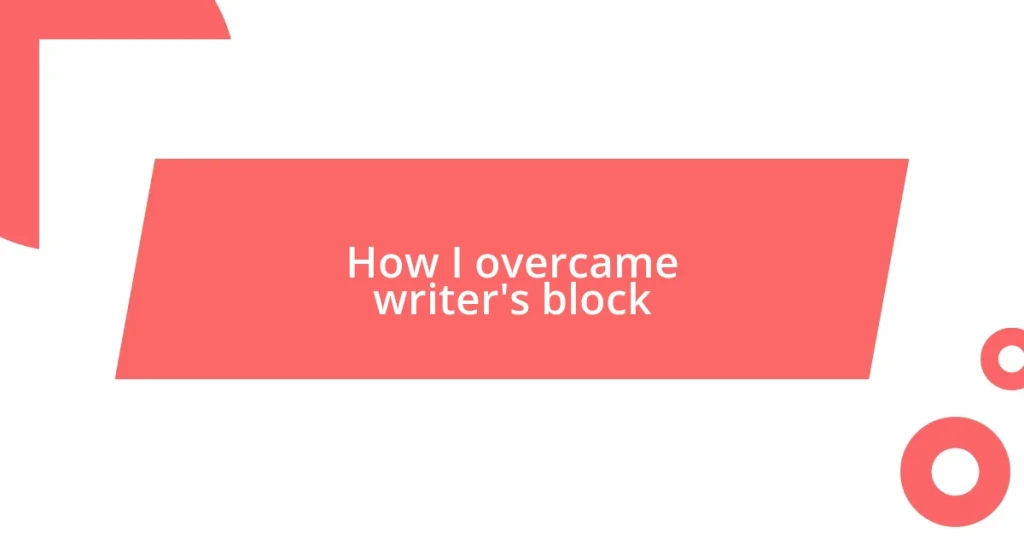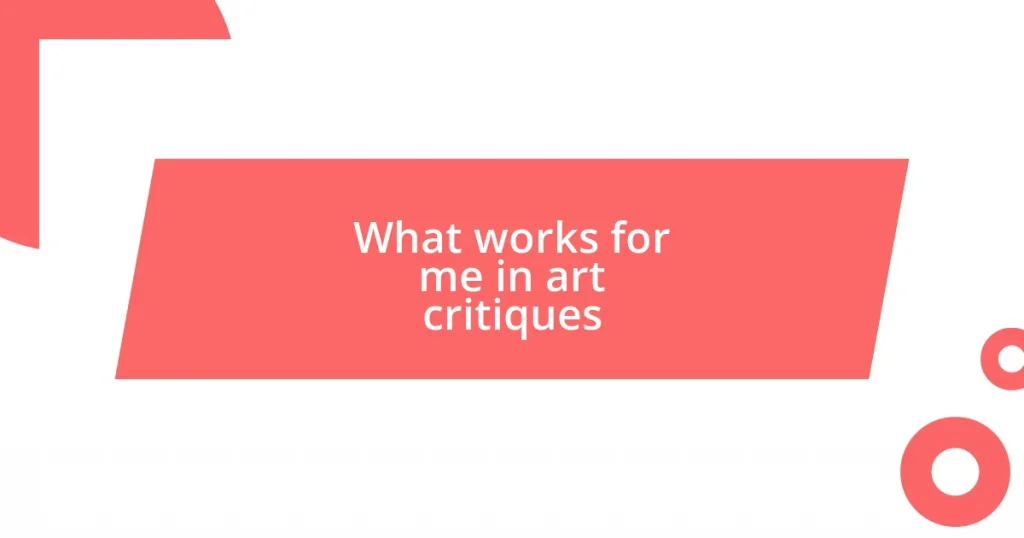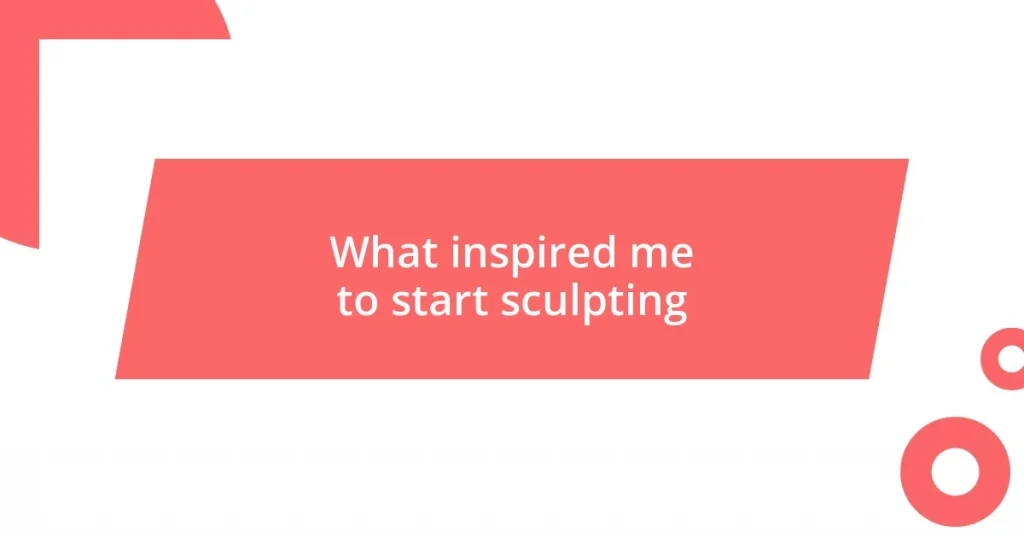Key takeaways:
- Understanding writer’s block involves recognizing its emotional roots, such as perfectionism and negative self-talk, and embracing imperfection as a way to break through.
- Establishing a consistent writing routine with dedicated time, a focused environment, and variety in activities fosters creativity and combats writer’s block.
- Utilizing techniques like freewriting, changing scenery, and reflecting on progress can rejuvenate creativity and reinforce a sense of community among writers.

Understanding writer’s block
Writer’s block is more than just feeling uninspired; it can often feel like an emotional barrier that holds us captive. I remember staring at a blank screen for hours, my fingers hovering over the keys but refusing to move. It’s frustrating, isn’t it? Sometimes, it feels like those words are locked away in a vault, and the key is nowhere to be found.
Many of us experience this struggle differently. For me, the pressure to create something perfect only intensifies the block. I’ve found myself questioning my abilities, wondering if I’ll ever write anything worthwhile again. Have you ever felt that nagging voice telling you that what you have to say isn’t important? It can be quite disheartening.
Understanding writer’s block also means recognizing its roots—stress, fear of judgment, or even perfectionism can all play a role. I recall a time when I had to set aside my expectations and allow myself to write poorly. That simple act of permission helped lift the fog, reminding me that creating anything, no matter the quality, is a step towards breaking free. What if the key to overcoming this barrier lies in embracing imperfection rather than fearing it?

Identifying your triggers
Identifying your triggers is a crucial step in conquering writer’s block. For me, it was essential to pinpoint the moments or feelings that caused my creativity to stall. I began to notice that certain times of day, like early mornings when I was still groggy, often stifled my thoughts. It’s fascinating how our environment can influence our mindset, isn’t it?
Here are some common triggers I’ve encountered:
- Perfectionism: The fear of producing something less-than-perfect can be paralyzing.
- Negative Self-Talk: That inner critic can be relentless, undermining confidence and stalling progress.
- Emotional States: Stress, anxiety, or even excitement can distract from the task of writing.
- Interruptions: Constant distractions from digital devices or noise can derail focus.
- Fatigue: Writing when I’m tired often leads to a mental fog that thickens my block.
By recognizing my triggers, I started to create strategies to mitigate them. For instance, I learned to write during specific times when I felt most alert, turning those moments into mini rituals. This approach transformed my writing experience.
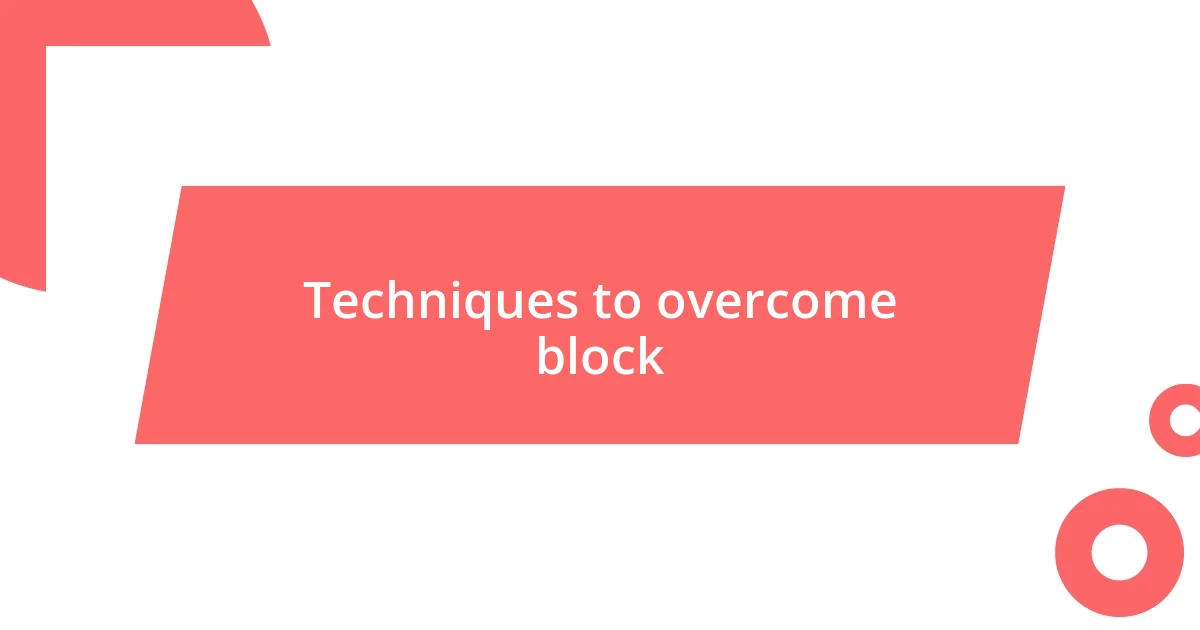
Techniques to overcome block
When it comes to overcoming writer’s block, one technique that has truly helped me is changing my environment. I’ve discovered that a simple shift in scenery can spark creativity. For instance, I often grab my laptop and head to a nearby café. The lively atmosphere, coupled with the aroma of coffee, seems to stimulate my thoughts in a way my home office sometimes can’t. Have you ever felt that a fresh perspective can realign your thinking?
Another effective strategy is freewriting, a technique where I write continuously for a set period without worrying about grammar or structure. I remember a day when I was completely stuck; I set a timer for just ten minutes. Pouring out my thoughts, I felt the tension gradually melt away. This practice encouraged me to let go of perfection and allowed the ideas to flow freely. Have you tried letting your pen or fingers lead the way without constraints?
Lastly, I find that taking breaks can rejuvenate my creativity. Whether it’s a short walk or engaging in a completely different activity, those moments away from the writing desk do wonders. I recall a specific afternoon when I stepped outside for some fresh air. Upon my return, I had a burst of inspiration that turned a stale writing session into a productive one. Isn’t it interesting how stepping back can lead to moving forward?
| Technique | Description |
|---|---|
| Change Environment | Alter your surroundings to spark creativity; even a different room can help. |
| Freewriting | Write continuously without editing; it encourages flowing thoughts. |
| Take Breaks | Engage in activities outside writing to refresh your mind and regain focus. |
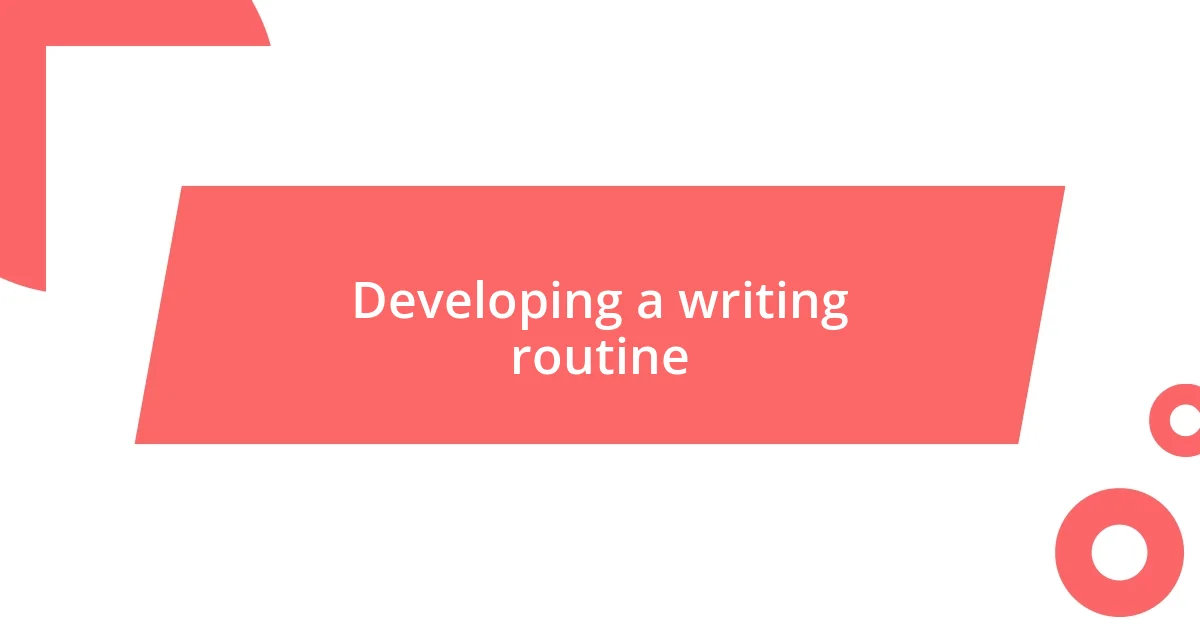
Developing a writing routine
Establishing a consistent writing routine has been one of my key allies in overcoming writer’s block. I’ve found that setting aside dedicated time each day creates a rhythm that signals my brain it’s time to create. Initially, I struggled, but once I embraced early mornings, I discovered that solitude and fresh coffee could ignite my creativity in ways I hadn’t expected. Is there a specific time that sparks your writing energy?
I also committed to a personal writing environment that fosters focus. For me, it meant banishing distractions—turning off notifications and finding a cozy corner in my home. It was a game changer. I remember one day sitting in my favorite chair, wrapped in a blanket, feeling safe and focused. That simple act allowed me to dive deeper into my thoughts, and I emerged with a completed draft that surprised even me. Have you ever noticed how the right space can amplify your creativity?
Additionally, I’ve learned the power of variety in my routine. Some days, I write, while others, I brainstorm or read. Mixing these activities keeps my mind engaged and prevents monotony from creeping in. I once dedicated a weekend to reading books on different subjects and found that this effort sparked countless new ideas. It made me wonder—how often do we let our routine become a comfortable but limiting cycle? Embracing variety not only energizes my writing but also expands my perspective, proving that inspiration can come from the most unexpected places.

Benefits of accountability partners
Having an accountability partner has been a transformative element in my writing journey. When I paired up with a fellow writer, I noticed not just an uptick in productivity, but also a shift in my mindset. Knowing that someone else was invested in my progress made me feel more committed. Isn’t it amazing how a simple connection can ignite motivation?
One weekend, during a particularly tough writing slump, my partner and I scheduled a virtual check-in. We shared our struggles and triumphs, and I felt a wave of relief wash over me. It was comforting to realize I wasn’t alone in feeling stuck. It’s almost magical how sharing your journey with someone can lighten the burden. Have you ever sensed that camaraderie can bolster your creativity?
Moreover, we established a routine where we exchanged goals weekly. This healthy pressure motivated me to push through obstacles, like that heavy weight I usually feel during writer’s block. I remember feeling particularly accomplished after meeting a deadline that seemed insurmountable. The accountability not only kept me on track but also instilled a sense of accomplishment in my writing. Have you contemplated how powerful it is to have someone cheering you on?

Utilizing creativity exercises
Using creativity exercises has proven to be an effective way to shake off the cobwebs of writer’s block. I often find myself engaging in simple activities like free writing, where I let my thoughts flow onto the page without any constraints. It’s fascinating how just allowing my pen to move freely can lead to unexpected ideas and connections. Have you ever experienced that rush when your thoughts suddenly come together?
Another exercise I love is the “mind mapping” technique. I vividly remember one afternoon sitting in a park, sketching out my thoughts for a story. By visually organizing my ideas, I could see relationships emerge that I hadn’t considered before. This method not only clears my mental fog but also guides me toward new paths in my writing. Doesn’t it feel liberating to see your thoughts take shape on paper?
Incorporating playful activities, like drawing or playing music, also serves as a refreshing break from writing. I once picked up my guitar and strummed a few chords when I hit a wall, and surprisingly, the melodies inspired a new direction for my narrative. The shift in medium brought a fresh perspective, sparking new ideas and energy. Have you explored how stepping outside your usual creative zone could unlock something remarkable?
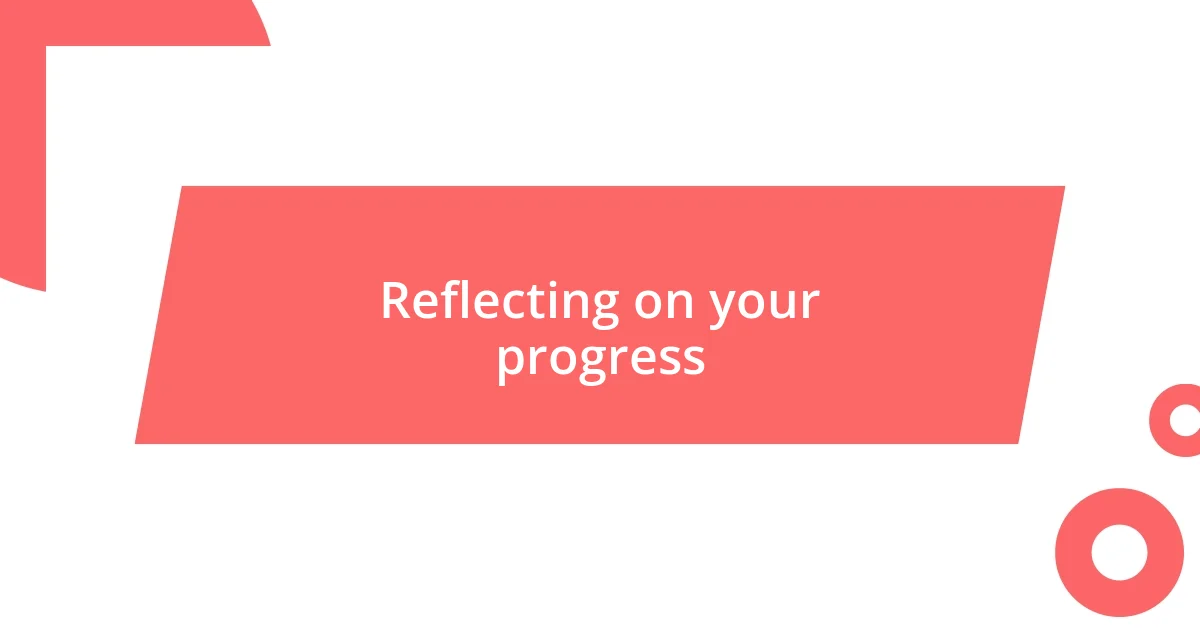
Reflecting on your progress
Reflecting on your progress can be a game-changer in overcoming writer’s block. I remember an afternoon when I took a quiet moment to go back through my previous writings. As I re-read those pieces, I felt a swell of pride mixed with surprise at how much I had grown. It’s incredible to see how each draft, filled with its own struggles and victories, contributed to my current skills. Have you ever been astonished by the distance you’ve traveled in your writing journey?
Sometimes, I jot down lessons learned from past experiences and milestones I’ve achieved. This not only helps me recognize patterns in my writing habits, but it also serves as a reminder that setbacks are part of the process. One time, after a particularly discouraging month, I noted down every piece I had written, no matter how small. That list became a testament to my perseverance, reminding me that progress isn’t always linear. How often do you take a moment to celebrate your small achievements?
When I share my reflections with fellow writers, the conversation often sparks new ideas and insights. I recall an inspiring discussion with a writing group where we each shared a significant moment that shaped our growth. Listening to others’ journeys illuminated paths I hadn’t thought of before, reinforcing the idea that we are all in this together. This sense of community fosters not only motivation but also a deeper understanding of our individual writing journeys. Have you found that sharing your experiences can renew your passion and drive?










